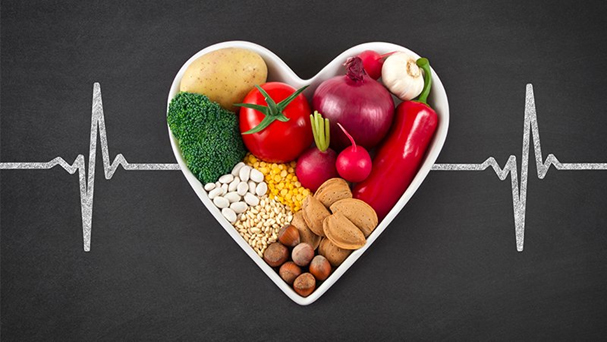Your heart is the engine that keeps your body alive and active. While genetics and lifestyle factors like exercise and stress play an important role in heart health, diet is one of the most powerful tools you can use to protect your heart. The right food choices can lower blood pressure, reduce cholesterol levels, prevent artery blockages, and decrease the risk of heart disease.
In this article, we’ll explore how diet impacts cardiovascular health, the best foods for your heart, what to avoid, and practical strategies for long-term wellness.
The food you eat directly affects your blood vessels, cholesterol levels, weight, and blood pressure—all of which are critical factors for heart health.
- Reduces bad cholesterol (LDL) and boosts good cholesterol (HDL).
- Controls blood pressure by regulating sodium and potassium balance.
- Prevents obesity, a leading risk factor for heart disease.
- Provides antioxidants and nutrients that repair and protect blood vessels.
- Improves blood sugar control, lowering the risk of diabetes-related heart complications.
Packed with vitamins, minerals, and antioxidants, fruits and veggies reduce inflammation and improve blood circulation. Leafy greens like spinach, kale, and broccoli are especially beneficial.
Whole wheat, oats, brown rice, and quinoa are rich in fiber, which helps lower cholesterol and maintain a healthy weight.
Sources like avocados, olive oil, nuts, and seeds contain monounsaturated and polyunsaturated fats, which support heart health by lowering bad cholesterol.
Salmon, mackerel, sardines, and tuna provide omega-3 fatty acids that reduce the risk of arrhythmias and prevent artery blockages.
High in protein and fiber but low in fat, legumes help control blood sugar and cholesterol levels.
Yogurt, skim milk, and cheese provide calcium and potassium, essential for regulating blood pressure.
- Processed foods: High in trans fats and sodium.
- Sugary drinks and desserts: Increase obesity and diabetes risk.
- Excess red meat: Linked to higher cholesterol levels.
- Fried foods: Contain harmful fats that clog arteries.
- Excessive alcohol: Raises blood pressure and damages the heart muscle.
Two of the most recommended eating patterns for heart health are:
- DASH Diet (Dietary Approaches to Stop Hypertension) – Focuses on fruits, vegetables, whole grains, and low sodium intake.
- Mediterranean Diet – Rich in olive oil, fish, nuts, whole grains, and fresh produce.
Both diets emphasize natural, nutrient-rich foods and are proven to lower heart disease risks.
- Replace white bread and pasta with whole-grain options.
- Cook with olive oil instead of butter.
- Limit salt by using herbs and spices for flavor.
- Add at least two servings of fish per week.
- Choose water or herbal teas instead of sugary sodas.
- Practice portion control to avoid overeating.
| Food Category | Best Choices for Heart Health | What to Limit or Avoid |
|---|---|---|
| Fruits & Vegetables | Leafy greens, berries, citrus fruits | Canned fruits in syrup |
| Whole Grains | Oats, quinoa, brown rice | White bread, refined flour |
| Protein | Fish, beans, lentils, skinless poultry | Processed meats, red meat |
| Fats & Oils | Olive oil, nuts, seeds, avocado | Trans fats, margarine |
| Beverages | Water, green tea, low-fat milk | Sugary sodas, excess alcohol |
A healthy heart begins with the choices you make at the dining table. By focusing on whole, nutrient-rich foods and limiting processed, high-fat, and high-sugar options, you can greatly reduce your risk of cardiovascular disease. Remember, small daily changes—like swapping fried food for baked options or soda for water—can have a big impact on your heart health over time.
1. Can diet alone prevent heart disease?
Diet plays a major role but should be combined with exercise, stress management, and medical checkups for the best results.
2. How much salt is safe per day?
Experts recommend limiting sodium intake to less than 2,300 mg per day (about one teaspoon of salt).
3. Are eggs bad for the heart?
In moderation, eggs are a good source of protein and nutrients. Excessive consumption, however, may raise cholesterol in some individuals.
4. Can vegetarian or vegan diets support heart health?
Yes, plant-based diets rich in whole foods are strongly linked to lower risks of heart disease.
5. How often should I eat fish for heart health?
At least two servings of fatty fish per week is recommended for optimal benefits.
6. Are dairy products safe for heart patients?
Low-fat dairy options can be part of a heart-healthy diet. Full-fat dairy should be consumed in moderation.
7. Do nuts help lower cholesterol?
Yes, nuts like almonds and walnuts contain healthy fats and fiber that reduce LDL cholesterol.
8. Can I drink coffee if I have heart issues?
Moderate coffee consumption (1–2 cups daily) is safe for most people, but excessive caffeine may raise blood pressure.
9. What role does fiber play in heart health?
Fiber lowers cholesterol, supports weight management, and improves overall cardiovascular health.
10. Is occasional junk food harmful to the heart?
Occasional indulgence is fine, but frequent consumption increases long-term heart disease risks.
